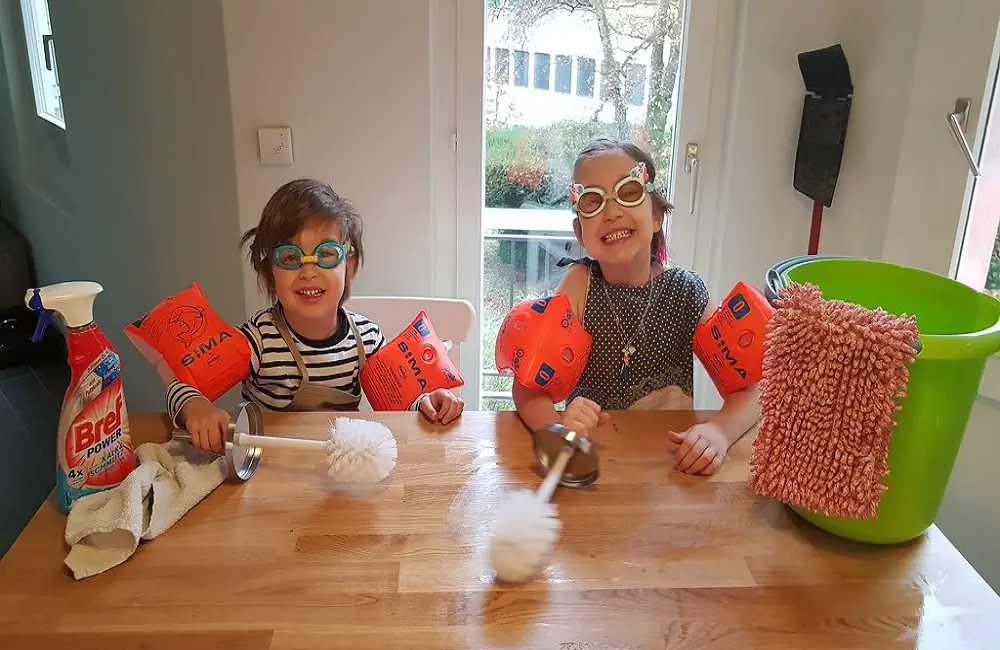It may initially seem inconvenient to have your children participate in household chores. However, taking the time to delegate tasks and involve them in maintaining the home can have long-lasting benefits.
Assigning chores to kids not only instills a sense of responsibility but also cultivates essential life skills that they will carry with them into adulthood. By contributing to the household, they develop a sense of purpose and learn the value of their contributions. Additionally, engaging in chores teaches them the importance of consistent effort in ensuring a smoothly running home.
Encouraging your children to take part in chores also provides an opportunity for them to experience pride in a job well done. By sharing the domestic workload, you’ll also have the chance to lighten your own burden. It’s worth mentioning that it’s never too early to start involving your children in simple, age-appropriate tasks – even toddlers can make valuable contributions.
Not only does introducing chores at a young age help them become adept at completing tasks, but younger children are often more inclined to offer their assistance willingly. So, whether it’s sweeping, setting the table, or tidying up their toys, engaging your kids in household chores from an early age is a valuable investment in their future development.
10 House Chores Easy Enough for Your Kids To Do
Laundry
When it comes to laundry tasks, there are actually plenty of things that kids can do to help out. Of course, they should not operate the washer and dryer, but starting them off with easy tasks is a great way to get them involved. Even very young children can participate in activities such as sorting dark and light clothing, folding towels, washcloths, and small clothes, matching socks, putting their laundry away, and unloading the dryer.
By involving children in these tasks, not only will they learn valuable skills and responsibility, but it will also lighten the load for parents or caregivers. So, don’t hesitate to delegate some laundry tasks to the kids!
Clear the dinner table
To instill the value of responsibility and cleanliness in your children, it is recommended to assign them the task of clearing the table after dinner. This practice can be introduced at a young age by having them bring their own plastic dishes to the sink or counter.
Additionally, involving them in wiping down the table after all the dishes have been cleared can further reinforce these habits. By incorporating these actions into their routine, children can develop a sense of accountability and contribute to maintaining a clean living environment.
Set the table
Children often display enthusiasm for assisting in setting the table, and this can be fostered by initially assigning them tasks involving non-sharp and non-breakable items. As they gain confidence and dexterity, their responsibilities can gradually expand to more challenging tasks with utensils and delicate objects.
Pick up after themselves
It is important to instill in your children the valuable adage, “Don’t put it down, put it away.” Teaching them this principle from an early age will foster a sense of responsibility and organization.
Instruct them to put away their toys, books, and clothes after they are done using them. Encourage them to tidy up any areas where they have made a mess.
Incorporating this routine into specific times of the day, such as before meals, outdoor play, bedtime, or when leaving the house, will help enforce the habit of tidiness and organization. By consistently reinforcing this practice, you are cultivating valuable life skills in your children that will benefit them in the long run.
Make their bed
Even at a young age, it is possible for children to acquire the skills to tidy their bedsheets and, at the very least, properly align their comforter. It is recommended to incorporate this task into their morning routine, after brushing teeth and hair, and getting dressed. Making the bed contributes to fostering discipline and orderliness right from the start of the day.
Choose outfit for next day
To minimize morning conflicts, encourage your child to independently select their outfit for the following day. Children are more inclined to cooperate when they feel a sense of autonomy in decision-making. When dressing for specific events or locations, such as church, provide them with guidelines or a range of suitable options to choose from.
Small kitchen tasks
One way to cultivate valuable life skills in children is by imparting kitchen knowledge that will benefit them as adults. Additionally, involving them in household chores such as food preparation and cleaning not only fosters independence but also instills a sense of responsibility. Here are several tasks that children can actively contribute to the kitchen environment:
- Put away groceries after shopping trips, ensuring items are organized and readily accessible.
- Assist in washing produce, promoting healthy eating habits and food safety.
- Encourage simple meal prep activities suitable for their age, allowing them to participate using safe utensils.
- Engage children in cleaning out the fridge periodically, teaching them about food storage and maintenance.
- Promote cleanliness by assigning the task of sweeping the kitchen floor, inculcating tidiness and discipline.
By involving children in these kitchen activities, they not only become more self-reliant but also develop a sense of accountability and active contribution to the household.
Dry mop floors
Encourage your child to engage in a playful activity by having them push a dry mop across the hard-surface flooring of your home. This enjoyable game not only entertains them but also aids in effectively collecting dust, pet hair, and fine dirt, as well as crumbs. By involving your child in this cleaning routine, you can develop a sense of responsibility while maintaining a clean and tidy living environment.
Empty or load dishwasher
Developing a routine daily task, such as the responsibility of putting away dishes, can be a valuable habit to instill in your child from a young age. By the time they reach around 6 years old, they can assume complete ownership of this task, alleviating you of the responsibility.
It is recommended to begin with the simple process of unloading clean dishes, gradually progressing to teaching them how to rinse and load the dishwasher. It is important to consider the age of your child in determining when they can safely handle sharp knives and breakable dishes.
Feed pets
Assisting in the care of household pets is an incredibly effective method to teach young children the importance of responsibility and compassion towards other living beings. One simple task that they can do is using a measuring cup to pour dry food into a dish.
As your child grows, you can gradually introduce them to more intricate pet care duties, further nurturing their sense of empathy and understanding.
How To Get Kids To Do Chores?
1. Make It A Game
One way to make chores more fun and engaging is to turn them into a game. For example, see who can pick up the most toys in five minutes or race your child to see who can fold laundry the fastest. By making chores a competition, you’ll appeal to your child’s competitive nature and turn housework into a fun activity.
2. Use A Chore Chart
Another way to motivate your child to do chores is by using a chore chart. Sit down with your child and discuss what chores they are responsible for, whether it’s taking out the trash, dusting the living room, or feeding the family pet.
Then create a chart that outlines each chore and the day of the week it needs to be done. As your child completes each task, they can check it off on the chart, which not only helps them stay on track, but also gives them a sense of accomplishment.
3. Make It Age Appropriate
It’s important to remember that not all chores are suitable for all ages. For example, asking a six-year-old to mow the lawn isn’t practical or safe. Instead, choose tasks that are age-appropriate and don’t require too much of a learning curve. If you’re unsure what tasks your child is ready for, start with small ones like making their bed or putting away their toys.
4. Offer Rewards
Incentives can be incredibly motivating for kids, so consider offering rewards for completing chores. This could be something as simple as extra screen time or a trip to the park. If your child is older, you might consider offering money in exchange for completed tasks. Whatever the reward, make sure it’s something that will motivate your child to complete their chores consistently.
5. Lead By Example
One of the most effective ways to get your kids to do chores is by leading by example. If you’re constantly leaving your dishes in the sink or throwing your clothes on the floor, your child will likely follow suit. On the other hand, if they see you consistently completing your own chores, they’ll be more likely to follow your lead.
Wrapping Up
Assigning simple household tasks to your children is a valuable practice that will benefit them tremendously in the long run, as well as providing assistance to you. By involving them in these responsibilities at a young age, they will develop important life skills that will help them become self-reliant individuals when they eventually leave home.
As they grow older, their capabilities will expand, and they will be able to take on more complex tasks such as preparing meals, managing laundry, caring for pets, and maintaining cleanliness throughout the house.
This early exposure will give them a solid understanding of the ins and outs of running a household, allowing them to be helpful and supportive partners in their adult lives. The advantages of engaging them in these activities are endless, so there is no better time than now to start implementing them into their routine.

